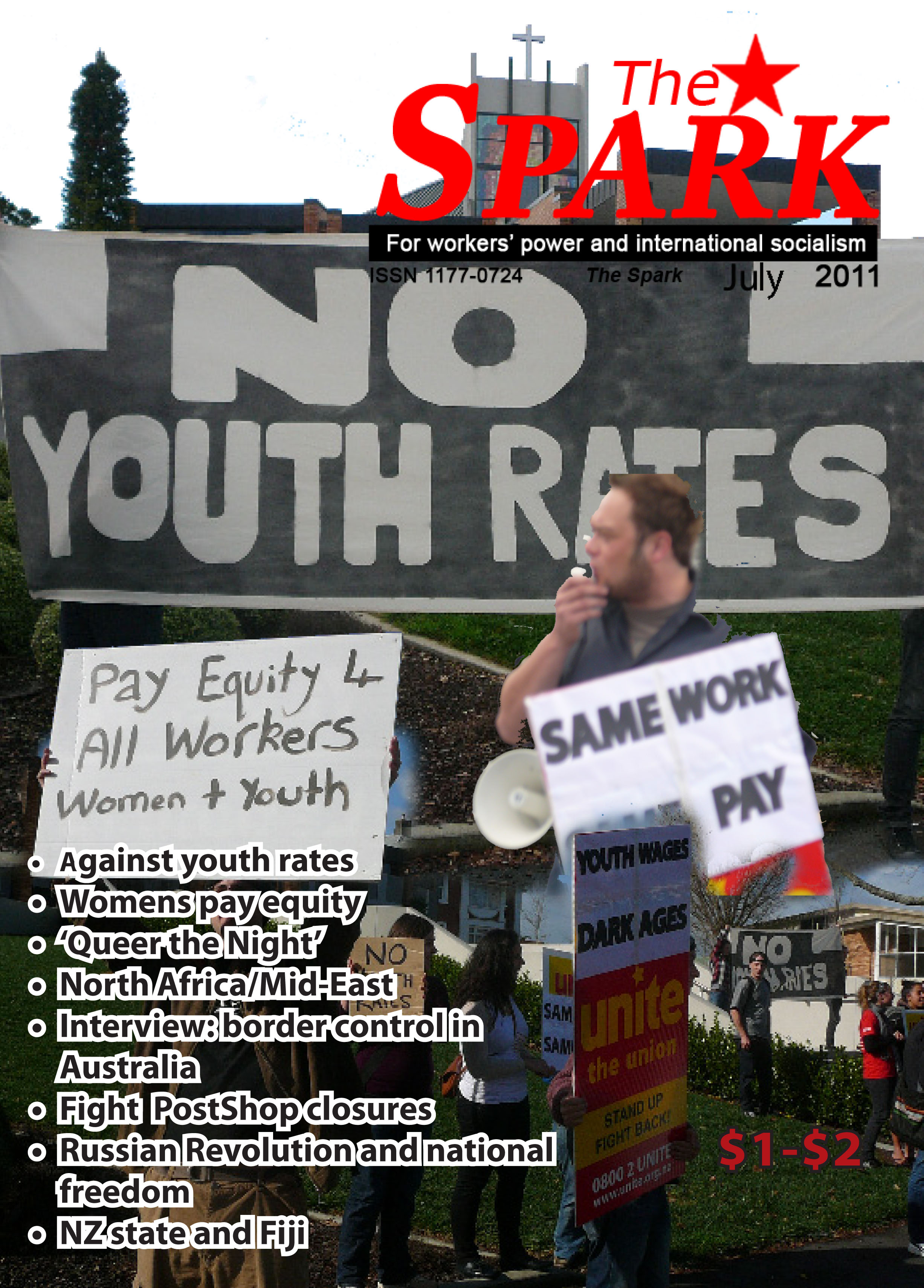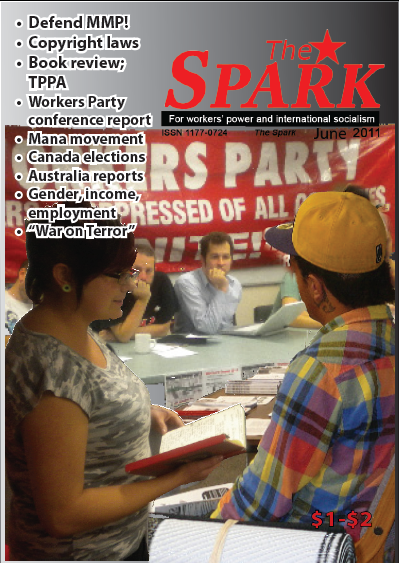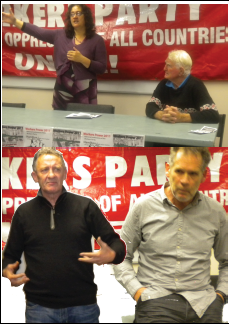 July issue of The Spark
July issue of The Spark
Last month the question of equality was blown open publicly and in quite a profound way by three events. The most prominent of these was of course the righteous controversy which resulted from Alasdair Thompson – CEO of the Employers and Manufacturers Association, the mouthpiece of a large section of the capitalist class – justifying the gendered wage gap on the basis of women’s menstruation. Away from the PR and spin-doctoring of the employers and government, who may present themselves as ‘centrist’, this really underlined the deeply reactionary essence of capitalism as it exists right now. We also had in Wellington a large demonstration of queer and transgender people demanding the right to not be bashed in the streets, which has prompted some tentative calls for a new GLBT liberation movement. This has included a large demonstration and organising meetings of up to 85 people. Thirdly, we saw the government indicate a possible reintroduction of youth rates, which was promptly opposed by a protest response within one week. We’ve been involved in the thick of the opposition against inequality and we aim to put The Spark and anti-capitalist ideology into the hands of others involved.
Note: As of July 4, this issue will carry a comprehensive insert which overviews te Mana Party by-election victory and the subsequent foundation hui.
Anti-Youth Rates protests send signal to government (regional round-up, photos)
By Byron Clark, Jared Phillips, and Chris Matahaere
On June 25 Unite and other progressive organisations, as well as socialists, sent a message to the government that any attempt to reintroduce youth rates will be met with resistance. These protests were very much the beginning and will be intensified – up to and including strikes and high school demonstrations – if the government does pursue a reintroduction. The Auckland and Wellington demonstrations went ahead successfully, with the Auckland demonstration being focussed on the head offices of the Employers and Manufacturers Association, whose CEO had in a radio interview justified the gendered wage gap by claiming that women are less productive because of ‘monthly sick problems’. The Auckland protest drew the connection between unequal pay for women and the potential for discriminatory rates to be applied to young workers. Below is a summary of activities in other major cities. Continue reading “Anti-Youth Rates protests send signal to government (regional round-up, photos)”
Legal battle over sleepover shifts demonstrates union role in women's pay equity struggle
Horizontal labour market segregation on the basis of gender has been well-entrenched in New Zealand’s economy, including within the care sector which is majority-comprised of women workers. The following article by Kelly Pope – a member of the Christchurch branch of the Workers Party who works as a mental health support person – demonstrates the continued relevance of the workers’ movement and trade unionism in addressing equal pay issues.
In 2007 the Service and Food Workers’ Union (SFWU) and the Public Service Association (PSA) took cases against two major residential service providers in the intellectual disability sector, attempting to gain minimum wage pay for hours spent on sleepover shifts. After a decision by the Employment Relations Authority that considered sleeping over to be work, the issue was appealed to the Employment Court by IHC in May 2009. A support worker who was employed by IHC’s IDEA Services, Phil Dickson, was the individual applicant in this case.
Since then, the Employment Court has found the existing payment of sleepover rates to be in breach of the Minimum Wage Act, ruling in favour of Mr Dickson and the union. A subsequent case taken to the Court of Appeal by IHC has resulted in the same outcome. Since this decision on 16th February 2011, the case has been taken further by IHC and will now be considered by the Supreme Court with a decision expected sometime after this year’s general election. While this long legal process has been unfolding, the PSA has filed additional legal proceedings against more than thirty health and disability support employers also currently paying below minimum wage sleepover rates, including Barnardos, Hawkes Bay DHB, Spectrum Care and Healthcare NZ. Continue reading “Legal battle over sleepover shifts demonstrates union role in women's pay equity struggle”
Most recent figures show women still coming off worse under capitalism
This article was prepared by The Spark editorial board and first appeared in the June 2011 issue of The Spark.
The most recent Statistics New Zealand figures show slight upward trends in terms of employment, income, and labour force participation. By no means can we equate this to a beginning of the end of the recession, as these are very minimal increases outside of and below the scale required to show recovery. One thing certain from the gendered statistics contained in the March 2011 quarter Household Labour Force Survey (HLFS) and the Quarterly Employment Survey (QES) is that women are still coming off worse under capitalism and are in fact being disproportionately impacted by the recession. Continue reading “Most recent figures show women still coming off worse under capitalism”
Canada’s election: NDP gains widen space for social struggles
This article by Roger Annis, a long-time socialist and retired aerospace worker in Vancouver BC, was first published in Green Left Weekly but was also written with publication in The Spark in mind. It was published by Green Left Weekly on May 23 and also in the June issue of The Spark.
The incumbent Conservative Party sailed to victory in Canada’s federal election on May 2 with the first majority government in the federal Parliament since the 2000 election. There was celebration in the boardrooms of the country. The victory caps a decades-long drive by much of Canada’s business elite to fashion a strong national government on a hard-right agenda.
The result is a deep disappointment for progressive-minded people in Canada. The Conservatives led by Stephen Harper will form the most right-wing government in modern Canadian history, extending the regressive path of their two minority governments won in the 2006 and 2008 elections.
But there is much in the election outcome from which to take encouragement. The Conservative vote rose only by a modest two percentage points (to forty percent), notwithstanding the huge sums the party spent on its campaign and the support it received from nearly every daily newspaper in the country. In Quebec, its electoral fortunes continue to decline, down 25 percent from 2008 and 33 percent from 2006. Continue reading “Canada’s election: NDP gains widen space for social struggles”
Defend young workers, fight all anti-worker laws (article & main protest event details)
By The Spark editors
This weekend there will be demonstrations in a number of cities to oppose the re-introduction of youth rates and to oppose any extension to the new entrant rate provisions.
National has already attacked working people and unions by changing union access rights, introducing new conditions for access to sick leave, and introducing a probationary employment procedure which provides employers with the power to sack workers without reason in the first 90 days of employment.
John Key and National’s Minister of Labour Kate Wilkinson have not ruled out a return to youth rates and are clearly putting youth rates back in the frame for discussion. Wilkinson, for instance, has cited high youth unemployment as a reason for the government to take a close look at policies that will give work experience to youth.*
The ability of employers to legally pay youth rates below the adult minimum wage for 16-18 year-olds was brought to an end in 2007. This victory was a result of a combined industrial campaign by Unite Union, street campaign by Unite Union and Radical Youth, and parliamentary campaign led by then Green MP Sue Bradford. This was one of the more significant offensive campaigns waged by the labour movement over the past decade. For a whole generation of younger workers it was certainly the most significant.
We will fight any attempts by the bosses and government to roll back wages and conditions of workers of any age group. Continue reading “Defend young workers, fight all anti-worker laws (article & main protest event details)”
Read the June issue of The Spark here

June issue of The Spark
This month’s issue of The Spark was delayed because of the involvement of the production team in organising the Workers Power 2011 conference (see report on pages 10-11). There are two additional conference reports from WP members who attended the Resistance conference in Sydney and the Socialist Party Australia conference in Melbourne. This month we have an article on the recent Canada elections from Socialist Voice (Canada) co-editor Roger Annis. A few of us met Roger in 2008 when he came to check out Unite Union in Auckland and we are pleased we have been able to establish some ongoing communication with him. In this issue we include an article that he produced for Green Left Weekly but also with The Spark in mind (we solicited shortly after GLW). So it’s a good issue in terms of expressing living internationalism! In our own backyard we’ve got new copyright laws thrown down, secretive trade negotiations going on, an electoral system referendum coming up, and the emergence of a new party with a working class constituency. Please read on and please support The Spark.
Workers Power 2011: Conference Report
Marika Pratley, Wellington branch of Workers Party
Workers Power 2011, the national conference of Workers Party was held over Queen’s Birthday weekend (June 3-6) at Hamilton’s Trade Union Centre. Over 45 people registered for what was the first socialist conference to be held in Hamilton for some decades. The conference featured a wide range of presentations delivered by speakers belonging to the Workers Party, by members of other left organizations, and by others who have participated in substantial struggles against the state and the injustices of capitalism.

Friday
The opening night featured a debate between Jared Phillips (WP) and Sue Moroney (Labour Party MP). Phillips’ case defined Labour as no longer even claiming the centre-left, quoting EPMU and leading LP figure Andrew Little’s reference to Labour and National “managing the centre”. He listed examples of active attacks that Labour has carried out against the working class and progressive forces including Operation 8 and restricting the right to strike. He outlined reasons as to why ‘lesser evilism’ was not a justifiable reason to support Labour. Moroney embraced the term ‘lesser evilism’ and said she would rather have ‘small pragmatic changes’ than a ‘glorious defeat’ by National. In reality, the speakers were clearly talking at cross-purposes.
This was followed by a presentation and lengthy discussion led by Marxist academic David Neilson who has been published in Capital and Class and Journal of Radical Economics. In summary, he outlined the need for a deeper appreciation of the shift of emphasis from the reserve army of labour to the relative population that is surplus to the requirements of capitalism. He related this to the burgeoning slum-dwelling class in under-developed countries as well as to the second tier of peripheral workers which is ever-increasing in proportion to core workers in advanced capitalist countries. In summary, he argued that this led to the current ‘workers of the world compete’ scenario rather than a ‘workers of the world unite’ scenario, and that the left had to take this into account in attempts to redefine a strategy.
Continue reading “Workers Power 2011: Conference Report”
WP-Labour Party debate, Friday June 3, Trades Hall, Hamilton
The office of Labour MP Sue Moroney has confirmed that she will be joining a debate on the moot ‘Should working people support Labour this election year?’ Jared Phillips of the Workers Party will be arguing ‘against’ from a far-left perspective and Sue will be arguing in favour.
The structure of the debate will be that each speaker will have 10 minutes to present, followed by 5 minutes each to respond to one another,  followed by questions and contributions from the audience.
followed by questions and contributions from the audience.
Sue Moroney is the 10th-ranked candidate on Labour’s party list for the upcoming election.
The Workers Party requested the debate which will be the opening item of its annual national conference from June 3-5 in Hamilton. The full schedule is viewable at http://fightback.zoob.net/wp-content/uploads/2011/05/full-shedule-leaflet-image1.png
Report from Take the power back! , national conference of Resistance
The national conference of Resistance was held May 6th – 8th at Redfern Community Centre, Sydney. Heleyni Pratley, a member of the Wellington Branch of the Workers Party, attended on behalf of Unite Union. Her following report will be published in the June issue of The Spark.
Resistance is the youth wing of the Socialist Alliance (Australia). Topics covered during the conference included Palestine, uprisings in the Middle East, refugee detention in Australia, and the environment. The conference began with an acknowledgment that we were on stolen Aboriginal land. Around 100 people attended this conference from all over Australia. Guests included Matthew Cassel from Chicago, former assistant editor of Electronic Intifada; Antony Loewenstein, a Sydney-based independent freelance journalist and author of the book My Israel Question; and Ravindran, a youth leader from the Socialist Party of Malaysia. Overall there was a positive welcoming environment, which is important for young people to be able to debate and ask questions freely. The workshops over the weekend echoed this sentiment. Continue reading “Report from Take the power back! , national conference of Resistance”
